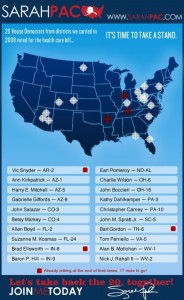The Other Hands on the Barrel
Politicians and commentators have been quick to caution that the horrific shooting of Representative Gabrielle Giffords and more than a dozen others was likely less a political act than the work of a deranged individual, and we’re sure to hear more such bromides in the days ahead.
It’s rubbish.
Those who are mentally unhinged act out their bizarre delusions in idiosyncratic and sometimes taboo or illegal ways, but they draw their vocabulary, their imagery and their preoccupations from their culture. However grotesquely distorted the expression, the reference points or cues are all around them … and us.
In shootings such as the one in Tucson, when there’s a long history of overtly violent political rhetoric and winking dare-yous, one young, possibly deranged man may pull the trigger, but there are many other, more respected hands on the barrel. Those “co-conspirators” in the Arizona shooting include Sarah Palin, her similarly extreme colleagues, the followers inflamed by their histrionics and the more circumspect politicians who have given her and the movement she represents their passive or active support to further their own careers.
That Sarah Palin put Representative Giffords in her crosshairs is not a matter of conjecture. This 2010 gaphic from her PAC’s website says it all:
We’d all like to believe our shared narrative of civil democratic discourse, but those who choose to further their careers with vitriolic, highly personal, even violent rhetoric and graphics and melodramatic theatrics must share the blame, if not the legal culpability, for the shooting that followed a tragically predictable course.
In the coming days, we can expect politicians and
commentators to try to stabilize the volatile mood by denying that this was a political conspiracy. The first one I heard edging in that direction was James Fallows on National Public Radio on Saturday afternoon, hours after the shooting. At the start of his remarks, Fallows emphasized, rightly, that “we just don’t know very much about the circumstances, who did it and for what reason.” Still, he had plenty to discuss.
Fallows acknowledged that “We have in the United States a long and unfortunately rich tradition of political violence. And on the one hand, any attack on a politician, it seems to me, is by definition political because that’s how that person came into public view.” But he adds:
“… it’s striking how often the motives for the crime seem to be obscure or really hard to connect to mainstream political activities.” And he harkens back to the shootings of Representative Leo Ryan (near Jonestown in Guyana), Governor George Wallace and Senator Robert Kennedy.
In summing up, Fallows says those shootings had “huge political consequences, but the motives seem as much a mental disorder or personal politics as anything else. And we don’t know how that will finally play out here.”
Although he mentions Palin’s poster suggesting violence (see above), his conclusion is not that “violence-tinged” rhetoric contributed to the Tucson shooting but that “perhaps there will be less of that tone” in the future.
And perhaps everyone will rally around bipartisan values and find a common language. And perhaps the Tea Party and its enablers will recognize that they need to be more measured in their future political rhetoric. And perhaps it will be 90 degrees in the shade in Washington, D.C., tomorrow.
For those of a more realistic bent, it’s important to recognize that those who will cover up this tragedy with a blanket of feel-good platitudes do a disservice to our country’s future. The role of journalists is not to help us feel good about ourselves.
It would be more helpful to the body politic if we point out that any such deadly act has complex but traceable roots in the culture as well as in the individual psyche. In this case the most visible roots are Sarah Palin herself, her angry allies and their inflamed, uncompromising “Don’t tread on me” rhetoric that at times is indistinguishable from neo-fascism; a large cadre of mainstream politicians who cynically condone such attitudes with carefully phrased euphemisms of support in order to win votes; permissive gun laws (and their primary sponsor, the National Rifle Association) that further the Wild West, gun-first, “I got my rights” culture; and the demagoguery against immigrants and other nonthreatening, hardworking social classes.
Helping to hide from view the dangerous dysfunctions — and outright immorality — of our political “discourse” are the commentators and politicians who will go to illogical lengths to persuade us that there is no real political dimension to this supposedly singular act of madness; that we’re OK, Jack, and everything will automatically rebalance itself quickly in this, the Greatest Democracy on Earth.

